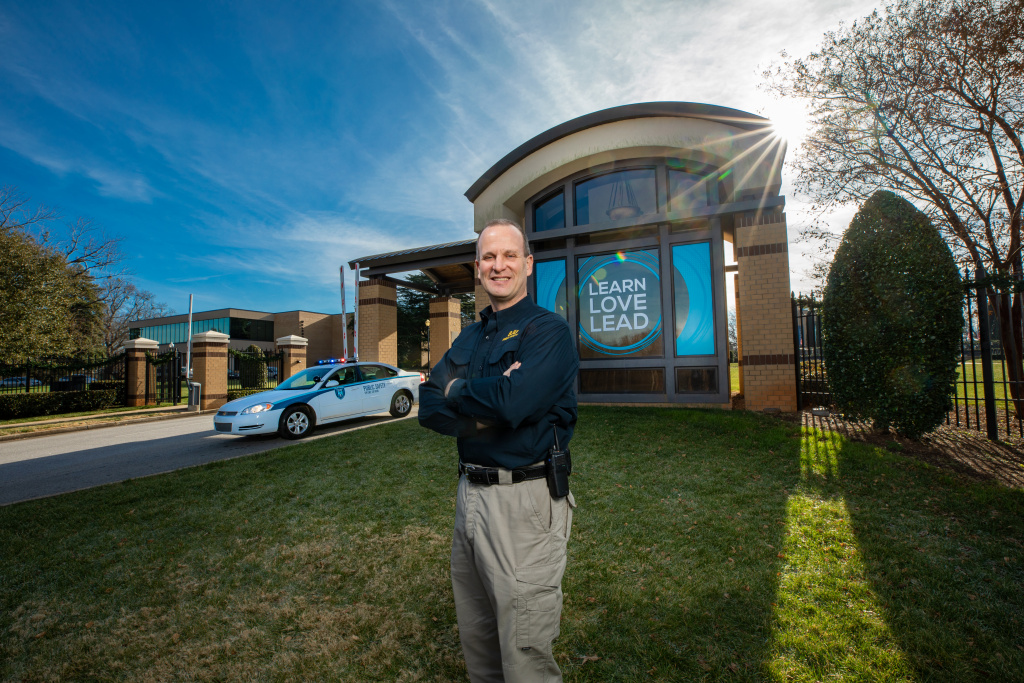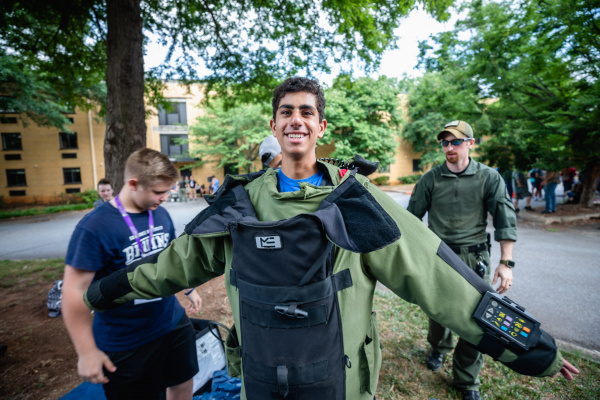“I remember when I hired the first person that wasn’t alive when I started law enforcement,” said Lance Crowe, former Travelers Rest (S.C.) Chief of Police. Crowe requested the young man’s birthday as he entered personal information into a computer to print an ID card.
“I said, ‘Oh, wow! That’s my anniversary date for getting hired in law enforcement. … Two years before you were born.’ ”
Crowe saw a lot of change in more than 26 years in law enforcement. Now he is passing on what he has learned to future generations by serving as a criminal justice associate professor at BJU and a Public Safety captain.
On Jan. 9, National Law Enforcement Appreciation Day, BJUtoday would like to thank Crowe and all law enforcement officers for the sacrifices they make daily, both in the public eye and behind the scenes.
A Morphing Goal
Crowe came to BJU in 1986 planning to follow in his father’s footsteps and be a U.S. Marine Corps pilot. As an officer candidate, Crowe needed to complete a bachelor’s degree. Because the Marines didn’t require a specific degree, Crowe started as a business major with an art minor, but he switched to studying graphic design in his second year.
While a student, Crowe sought a campus job he could perform after classes. “I took a night watch on Public Safety just because it was a nighttime job that interested me. But I told them that I never wanted to wear a uniform. I never wanted to be a cop,” he said.
See Also: Explore the Criminal Justice program
Little did Crowe know that his part-time job with Public Safety would change his career path. “Along the way, I got interested in law enforcement instead of the military program,” he said. “So, I pulled out of the military program.” Rather than change his major a second time, Crowe decided to finish as a graphic design student, meanwhile rising to master sergeant within Public Safety. After graduation, he went to work as a deputy sheriff for the Spartanburg County Sheriff’s Office.
A Changing Role
Crowe filled many roles in Spartanburg County, doing “a little of everything” from 1991 until March 2005. “(I) basically did everything except narcotics and detectives. I was a patrol deputy, became a sergeant over a group of guys on a shift, and then became the third shift lieutenant, and then became an administrative lieutenant—an office kind of lieutenant—Monday through Friday,” he said.
In 2005, with a new sheriff entering office, the former sheriff’s staff was shuffled to new positions. Instead of returning to road patrol, Crowe accepted the position as captain in the Travelers Rest Police Department. He was second in command.
“And that’s really all I planned to do,” he said. The next year, however, the Travelers Rest police chief retired. Crowe said about 40–50 people, including him, applied to fill the vacancy. He was named Chief of Police in June 2006, a position he held until September 2018.
A Passing Patrol
Crowe returned to BJU in May 2019, a plan he said was years in the making. “Mike Wilkie pushed me to get my master’s so that I could come here and teach. That was kind of the plan,” he said.
But the plan didn’t come to fruition as quickly as Crowe hoped. When chief Joe Mulnix offered Crowe a Public Safety position, he was hesitant to accept. “I just (wanted) to make sure the school (didn’t) think I (was) choosing one career path there over another. I (wanted) them to know I (was) still interested in teaching.”
Mulnix was able to work with the academic administration to “cobble together this position that’s half Public Safety, half teaching,” said Crowe. Now, Crowe supervises the dispatchers at the main campus entrance in addition to teaching two criminal justice courses each semester.
“(Lance) has come into this academic field not only well-qualified but also well-experienced, you know, having been on the county sheriff’s department, working his way up through administration, being the police chief of a local department,” fellow criminal justice faculty member David Davis said. “He just has skills and abilities, talents that he is able through his relationships with the (students) to really transfer that knowledge in a great way. They love him.”
As Crowe said, “What do you do after you’ve been a police chief? … You take all that and you pass it on to others.”








